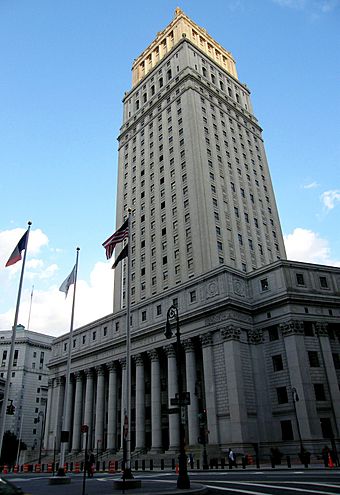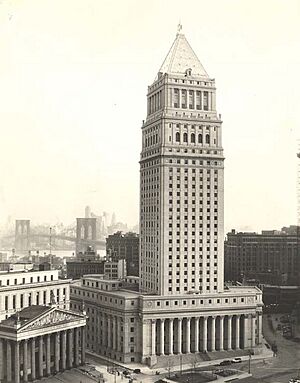Thurgood Marshall United States Courthouse facts for kids
|
U.S. Courthouse
|
|

(2009)
|
|
| Location | 40 Centre Street Manhattan, New York City |
|---|---|
| Built | 1932-36 |
| Architect | Cass Gilbert, Cass Gilbert Jr. |
| Architectural style | Classical Revival |
| NRHP reference No. | 87001596 |
Quick facts for kids Significant dates |
|
| Added to NRHP | September 2, 1987 |
The Thurgood Marshall United States Courthouse is an important building in New York City. It is located at 40 Centre Street in lower Manhattan. This building is a courthouse, which is where legal cases are heard.
The courthouse was designed in a style called Classical Revival. This means it looks like ancient Greek and Roman buildings. It was designed by a famous architect named Cass Gilbert and his son, Cass Gilbert, Jr.
Today, two important courts use this building. These are the United States Court of Appeals for the Second Circuit and the United States District Court for the Southern District of New York. They handle many different types of legal cases.
Contents
History of the Courthouse Building
The idea for a new federal courthouse began in 1931. Architect Cass Gilbert was chosen to design it. He started working on the design in 1933. Construction of the building began in July 1932. It took about three and a half years to build.
This courthouse was one of the first tall buildings built by the U.S. government. After Cass Gilbert passed away, his son, Cass Gilbert Jr., finished the project. The building was completed in 1936. At first, it was called the Foley Square Courthouse.
The courthouse was added to the National Register of Historic Places on September 2, 1987. This list helps protect important historical places.
Over the years, many important legal events have happened here. In 1992, three large, historic courtrooms were made to look new again. The whole building was also greatly updated in 1999.
In 2001, the United States Congress decided to rename the building. They wanted to honor Thurgood Marshall. He was a very important judge who worked in this building from 1961 to 1965. Later, he became a judge on the highest court in the country, the Supreme Court of the United States. The building was officially renamed on April 15, 2003.
From 2006 to 2013, the Second Circuit court moved out for a big renovation. They used another courthouse nearby during this time. Once the work was done, they moved back into the Thurgood Marshall Courthouse.
Courthouse Design and Features
The Thurgood Marshall Courthouse is a very tall building. It has two main parts: a wide base and a tall tower. Together, the building is about 590 feet (180 meters) tall. It has 37 floors.
Outside the Building
The bottom part of the courthouse is six stories tall. It has a grand front with many columns. This part of the building is built around three inner courtyards. It has a unique shape that follows the land it sits on.
Large granite steps lead up to the main entrance. These steps are on Foley Square. The architect wanted to put two big statues here, but they were never made. Ten tall, four-story columns stand at the entrance. They create a grand porch. The decorative band above the columns has detailed flower designs.
At the ends of this decorative band, there are round carvings. They look like old coins. On these carvings, you can see the faces of four famous lawgivers from history: Plato, Aristotle, Demosthenes, and Moses. The outside of the courthouse is made of a light-colored granite from Minnesota. It has hints of peach and gray.
Behind the base, a 30-story square tower rises up. It is set back a little from the front of the building. The tower gets slightly narrower at the 27th floor. The top of the tower is shaped like a pyramid. It is made of terracotta and covered in gold leaf. There is also a small, open lantern at the very top, also covered in gold.
Inside the Building
Main Hall and Details
The main hall inside the building is very grand. It runs across the front of the building. Its design is similar to the main hall of the United States Supreme Court building. The floors are made of white marble with green and black veins. The walls are also white marble, but with gold and cream colors. This creates a nice contrast.
The ceiling is very detailed. It has a Greek key design and is divided into many square sections. These sections are decorated with large plaster rosettes. These rosettes are tipped with 22-karat gold leaf. Some have a red background, and others have a blue background.
Many of the inner doors, including the elevator doors, have beautiful bronze decorations. These bronze details show symbols related to law and government. For example, there are dolphins, which can represent new beginnings and democratic ideas. You can also see grasshoppers eating wheat, with the Greek word meta (meaning "to transform"). This suggests that change is important for growth. There are also owls, which stand for wisdom, and acorns and oak leaves, which mean strength.
The building has 35 courtrooms in total. Sixteen of these are original to the courthouse. Five are in the base, and eleven are in the tower. This includes the historic Court of Appeals courtroom. All these rooms have wood-paneled walls. They also feature tall, rounded arches and fluted columns. The Greek key design from the main hall is also found around the ceilings of the tower courtrooms. The Court of Appeals courtroom ceiling also has symbols related to sailing.
Library in the Tower
On the twenty-fifth floor of the tower, there is a tall library. It has large ceiling beams supported by decorative brackets. These brackets are painted with leaf designs. The library's high, arched windows offer amazing views of the Manhattan skyline.
Nearby Buildings
The Thurgood Marshall Courthouse is surrounded by other impressive buildings. Next to it are two tall structures: the Manhattan Municipal Building (built in 1914) and the Daniel Patrick Moynihan United States Courthouse (built in 1994). Also facing Foley Square, near the Thurgood Marshall U.S. Courthouse, is the New York County Courthouse (built in 1926).
See also
 In Spanish: Palacio de Justicia de los Estados Unidos Thurgood Marshall para niños
In Spanish: Palacio de Justicia de los Estados Unidos Thurgood Marshall para niños
 | Mary Eliza Mahoney |
 | Susie King Taylor |
 | Ida Gray |
 | Eliza Ann Grier |


